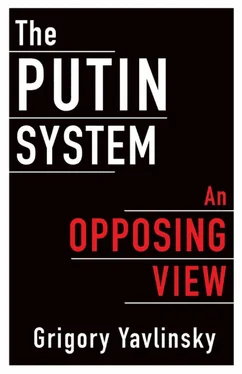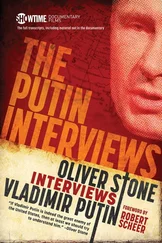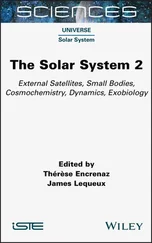This one reason is already enough to explain why it was highly unlikely that Russia in the early 1990s would develop a classical competition-based political system with all its democratic attributes, such as law-abiding political parties, relatively neat forms of political rivalry, and a fair tallying of election results with unpredictable outcomes. The gulf separating various groups within Russia’s political class from each other, in terms of their views on how Russian society should be organized in the future and what its intermediate and long-range interests should be, was just too wide for this to happen. Incidentally, this is precisely why the competition-based system took hold and got off the ground in the Baltic states formerly under Soviet rule—in spite of all the difficulties and failures and even though, truthfully, the capitalism that they gained back is of a peripheral type—while in Russia and in most other former Soviet countries it did not happen.
This was arguably the central factor in the logic of the formation of an authoritarian instead of a competition-based political system in the 1990s in Russia. But it was undoubtedly reinforced by other factors as well. In particular, even since the beginning of the twentieth century, the development of government institutions in Russia increasingly lagged behind the developmental needs of society and behind the understanding on the part the educated portion of society that articulated those needs. Despite the fact that Russian society was prepared for a leap toward modernization and had realistic chances to accomplish it, at a certain point, the institutions of governance froze, proving to be too rigid, and thus did not let those chances materialize. By the start of the twentieth century, the outdated character of those institutions was acting as a brake upon the country’s economic and political development. To an extent, this backwardness of political forms was the root and cause of the acute crisis of 1917–1918, which turned out to be too much for Russian statehood at the time to handle. The outcome of it was a tragic period, when Russia was subjected to a brutal and unsuccessful experiment in constructing a nonmarket economy with a totalitarian political superstructure.
In the late 1980s, that experiment came to an end, yet the backwardness of Russia’s political forms, which had been the major contributing factor behind that experiment, was still there. Moreover, the political system of post-Soviet Russia reproduced not just the many flaws of the Soviet system but also those of the pre-Soviet, pre-Bolshevik institutions of imperial Russia. These flaws included excessive centralization of power, inadequate feedback loops, a lack of balance among various institutions, insensitivity of the authorities to the changing needs and demands of society, and the lack of effective mechanisms of parliamentary control over the executive (in post-1993 Russia, the president’s powers, whether informal or officially established, have been nearly monarchical, unrestrained by either law or political practice). Furthermore, the powers that be are not in the habit of looking for reasonable compromises that would open up space for social and political transformations without antagonizing significant strata and forces in society. There also is no habit of replacing individuals in power on a regular basis and on the grounds of an unbiased assessment of the outcomes of their work.
All these congenital flaws in Russia’s political development, dating back as far as the beginning of the twentieth century, were reenacted in the course of its post-Soviet reconstruction. This was exacerbated by the drastic decline in the educational and cultural standards of Russia’s political class, compared to pre-Soviet times. The seventy-year-long Soviet era largely undermined what could have become the economic foundations of a competition-based political system: the presence of various groups of large property owners who would be willing and able to support rival political teams capable of acting as the key protagonists in legal political competition.
Moreover, for a long period of time, Russians had no idea about any forms of property ownership other than personal or state ownership. Thus, the emergence of a stratum of individuals who might view themselves as full-fledged, legitimate owners of private property, having not only the right but also the responsibility to take active part in civic and political life in terms of having a seat at the table rather than being “on the menu,” would require time, robust public debate, and even educational efforts.
At the outset of the Soviet era, the propertied classes of private owners, such as landed gentry, merchants, industrialists, and even affluent peasants (who had just barely gained the feeling of being the actual owners of the land that they tilled) were destroyed, not just as “economic classes” but also literally, by physical extermination. From the standpoint of what I have said about the need for a propertied class to sustain political competition, this disaster had immense negative implications, including implications for the political consciousness of the country’s population. There were no economic groups that could become an adequate substitute to those classes in every sense of it—not small semiprivate cooperative traders of the late Soviet period; not the so-called red directors, the government-appointed managers of large production units on the eve of privatization (who all of a sudden gained power over vast industrial and agricultural assets while having only tangential relationship to the prior development of these public assets); not the beneficiaries of the “small-business privatization” of the early 1990s, that is, former managers of small Soviet-era trading firms, construction business, and services; and certainly not the former criminal and semicriminal elements (including petty black market peddlers and managers of large clandestine networks) that rose up from the de facto underground and attempted to seize control of the most lucrative opportunities in commercial distribution and finance.
The last Soviet generation grew up and came of age at a time when the totalitarian state, personified by whichever individual was in charge at the top, was in total control of the country’s assets in their entirety, both by law and in practice. There was no way they could accept these newly emerging groups of propertied people as legitimate owners, empowered to handle the enormous assets at their discretion, let alone trust them to use those assets as an instrument for defending their political interests. Even wealthy people themselves could not feel at ease in this capacity—both because of their worldview, which was shaped by the total monopolism of the Soviet system, and because of the hostility they felt from the bulk of the population. The majority of Russians persisted in their belief that there were no “sacred rights of property” in the country prior to and independent of the country’s highest ruler and his benevolent attitude.
This view of the country’s top authority as the only legitimate source of property rights, especially for large-scale industrial and agricultural assets, survived even the tumultuous period of the early 1990s and has persisted into the subsequent stages of the post-Soviet era. In those stages, as Russia’s central government rediscovered its strength, it began to actively reinforce those stereotypes in society by transmitting, directly or indirectly, the message that all other sources of property ownership were a form of banditry and a theft of property from the people.
This, in turn, has made it psychologically impossible for most Russians to separate the functions and powers of government authority from the functions and powers of that sole individual who is ensconced at the top of the pyramid of power. This also leads to ascribing to this individual powers and capabilities that he does not possess in reality. Another consequence is that the authorities and their supporters effectively deny any opposition groups or individual politicians the right to use government resources in their struggle for power against the dominant group. Neither this ruling circle nor Russian society at large find the authorities’ monopolistic control of the distribution of all key resources in the country to be unnatural or unacceptable, let alone criminal. To the contrary, they sanctify this monopolistic power by the use of tradition, drawing upon a variety of “religious” and “historical” justifications. The implicit underlying message is that this single-handed control over all resources is the natural form of organization and functioning of the powers that be. This alone is sufficient to present a daunting challenge to anyone who would try to establish a workable system of governmental checks and balances built upon the suitable economic foundation of autonomous groups of large and small property owners.
Читать дальше












